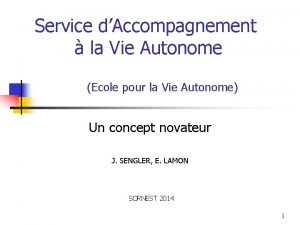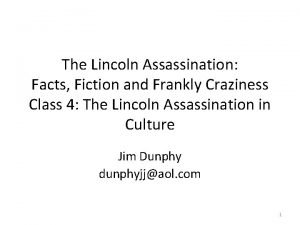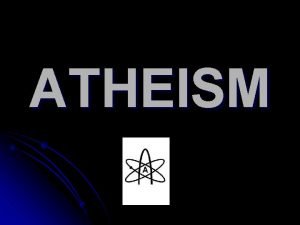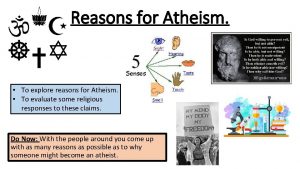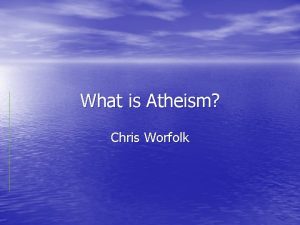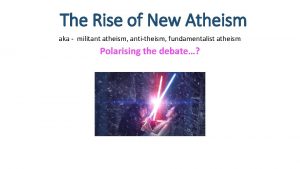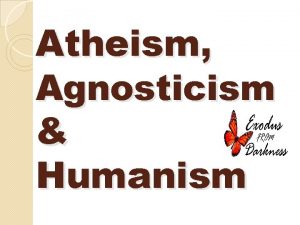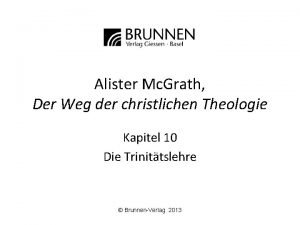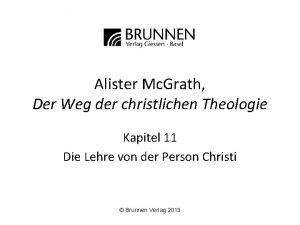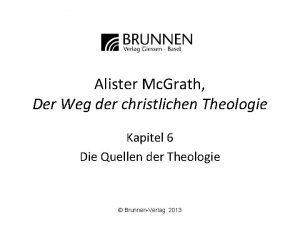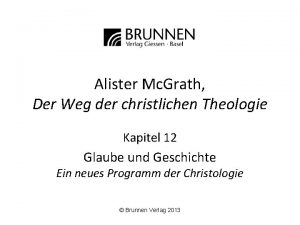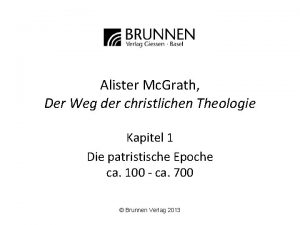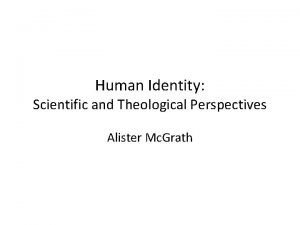The Twilight of Atheism Professor Alister Mc Grath

























































- Slides: 57

The Twilight of Atheism? Professor Alister Mc. Grath Oxford University

The Origins of Modern Atheism - Desire for autonomy - Oppression by church - Longing to break with the past William Wordsworth (1804) on the French Revolution: Bliss was it in that dawn to be alive But to be young was very heaven!

The Golden Age of Atheism A period of exactly two hundred years 1789: the fall of the Bastille, and the beginning of the French Revolution 1989: the fall of the Berlin Wall, and the collapse of atheist regimes in eastern Europe

The French Revolution: 1789

The Dawn of the Golden Age Hostility towards the French Catholic church Church seen as oppressive Christianity seen as holding people back from their true destiny Voltaire (1694 -1778)

Voltaire

Voltaire Is it any wonder that there atheists in the world, when the church behaves so abominably?

But revolution doesn’t need to be atheist! Think of the American Revolution of 1776! Hostility on the part of Americans to the established Church of England did not translate into hostility towards Christianity itself

Dostoyevsky (1821 -81)

Dostoyevsky If God exists, then everything is His will, and I can do nothing of my own apart from His will. If there’s no God, then everything is my will, and I’m bound to express my selfwill.

The Berlin Wall

1989: The End

The Origins of Modern Atheism Ludwig Feuerbach (1804 -72) Karl Marx (1818 -83) Sigmund Freud (1856 -1939) Richard Dawkins (born 1941)

Ludwig Feuerbach (1804 -72)

The Essence of Christianity (1841) Basic idea is that belief in God is a “projection” of human longings There is no God – so we invent one Later developed by Freud into the idea of God as a “wish-fulfilment”

Problems with Feuerbach • Things don’t exist because we want them to - but it is nonsense to say that, because we want something to exist, it cannot exist for that reason! • The argument works against both theist and atheist • Christian doctrine of creation has much to say here!

Atheism today A new form of atheism has emerged in the last few years, partly in response to 9/11 Leading figures are Richard Dawkins, Daniel Dennett, Sam Harris

As Dawkins’ book The God Delusion has now been published in Dutch, we will explore some of its basic arguments

Richard Dawkins

Richard Dawkins (born 1941) The Selfish Gene (1976) The Extended Phenotype (1981) The Blind Watchmaker (1986) River out of Eden (1995) Climbing Mount Improbable (1996) Unweaving the Rainbow (1998) A Devil’s Chaplain (2003) The Ancestor’s Tale (2004) The God Delusion (2006)

The God Delusion “If this book works as I intend, religious readers who open it will be atheists when they put it down. ”

The God Delusion Four major points 1. Belief in God is irrational 2. Science shows us there is no God 3. Faith in God can be explained away on scientific grounds 4. Faith in God leads to violence

1. Belief in God is irrational Faith in God is infantile

Faith is irrational Belief in God is “a persistently false belief held in the face of strong contradictory evidence. ”

Faith and Proof Can God’s existence be proved? Or disproved? Arguments about God’s existence have been stalemated for generations Atheism and theism are both faiths; neither can prove their case with total certainty.

If the natural sciences necessitate neither atheism nor religious faith, we seem to have two broad options about belief in God: 1. The question lies beyond resolution; 2. The question has to be resolved on other grounds

Inference to best explanation Gilbert Harman, "The Inference to the Best Explanation. " Philosophical Review 74 (1965): 88 -95. More recent explorations include: Peter Lipton, Inference to the best explanation. London: Routledge, 2004.

“Inference to the best explanation” Idea developed by Gilbert Harman There are many potential explanations of the world So which offers the best fit? The simplest? The most elegant? Not a knock-down argument – but an important attempt to evaluate how we make sense of complex situations

The idea of "empirical fit" What worldview makes most sense of what we observe in the world? What "big picture" offers the best account of what we experience? “Inference to the best explanation" is about working out which explanation is the most satisfying

The idea of "empirical fit" Richard Dawkins: "The universe we observe has precisely the properties we should expect if there is, at bottom, no design, no purpose, no evil and no good, nothing but blind pitiless indifference. " River out of Eden, 133.

The idea of "empirical fit" C. S. Lewis: "I believe in Christianity as I believe that the Sun has risen – not only because I see it, but because by it, I see everything else. " C. S. Lewis, "Is theology poetry? ", in Essay Collection and Other Short Pieces. London: Harper. Collins, 2000, 10 -21; 21.

God as a “virus of the mind”? Problem 1: Real viruses can be seen – for example, using cryo-electron microscopy. Dawkins’ cultural or religious viruses are simply hypotheses. There is no observational evidence for their existence.

Tobacco Mosaic Virus

God as a virus? Problem 2: On the basis of Dawkins’ criteria, isn’t atheism also a virus of the mind? He has no objective, scientific method for distinguishing between his own faith (atheism) and that of others (such as Christianity).

Are all beliefs “viruses of the mind”? Dawkins holds that belief in God is a “virus of the mind”. But there are many other beliefs that cannot be proven – including atheism Dawkins ends up making the totally subjective, unscientific, argument that his own beliefs are not “viruses”, but those he dislikes are.

2. Science shows us there is no God If so, why are so many scientists Christians? Francis Collins, The Language of God Owen Gingerich, God’s Universe Dawkins: real scientists don’t believe in God!

The limits of science Dawkins argues that science proves things with certainty Anything worth knowing can be proved by science Everything else – especially belief in God! – is just delusion, wishful thinking, or madness

Science and Knowledge: One Viewpoint "Whatever knowledge is attainable, must be attained by scientific methods; and what science cannot discover, mankind cannot know. " Bertrand Russell

Science and Knowledge: Another Viewpoint "The existence of a limit to science is, however, made clear by its inability to answer childlike elementary questions having to do with first and last things – questions such as "How did everything begin? "; "What are we all here for? "; "What is the point of living? " Peter Medawar, winner of the 1960 Nobel prize for medicine.

A q uestion. . . If the sciences are inferential in their methodology, how can Dawkins present atheism as the certain outcome of the scientific project? Richard Feynman: scientific knowledge is a body of statements of varying degree of certainty – some most unsure, some nearly sure, but none absolutely certain.

3. Explaining the origins of religion Are we predisposed to believe in God? Dawkins suggests that there is some psychological need to believe in God Basic argument: There is no God But lots of people believe in God Therefore they invent God to meet their needs

The “meme” Dawkins invented the “meme” in 1976 Nobody else takes it with great seriousness But it’s crucial to his argument in The God Delusion So what is a meme. . ?

Four fundamental problems about memes. . . 1. There is no reason to suppose that cultural evolution is Darwinian, or indeed that evolutionary biology has any particular value in accounting for the development of ideas.

Four fundamental problems about memes. . . 2. There is no direct evidence for the existence of “memes” themselves.

Four fundamental problems about memes. . . 3. The case for the existence of the “meme” rests on an analogy with the gene, which proves incapable of bearing theoretical weight that is placed upon it.

Four fundamental problems about memes. . . 4. Quite unlike the case of the gene, there is no necessary reason to propose the existence of a “meme” as an explanatory construct. The observational data can be accounted for perfectly well by other models and mechanisms.

Simon Conway-Morris on Memes are trivial, to be banished by simple mental exercises. In any wider context, they are hopelessly, if not hilariously, simplistic. To conjure up memes not only reveals a strange imprecision of thought, but, as Anthony O’Hear has remarked, if memes really existed they would ultimately deny the reality of reflective thought.

4. Belief in God causes violence Dawkins rightly points out that religion has caused lots of problems – such as intolerance and violence But so did atheism in the twentieth century – witness its attempts to forcibly eliminate religion The real truth is that beliefs (religious or atheist) can make people do some very good and very bad things.

Religion and Violence Religion provides a transcendent motivation for violence But what about transcendentalization of human values? Example of Madame Roland (executed 1792” “Liberty, what crimes are committed in your name!”

What about Jesus? “Jesus was a devotee of the same in-group morality – coupled with out-group hostility – that was taken for granted in the Old Testament. Jesus was a loyal Jew. It was Paul who invented the idea of taking the Jewish God to the Gentiles. Hartung puts it more bluntly than I dare: ‘Jesus would have turned over in his grave if he had known that Paul would be taking his plan to the pigs. ’”

Religion is a bad thing Now "science has no methods for deciding what is ethical. " - A Devil’s Chaplain, 34. So how do we determine that religion is "bad" empirically?

W. R. Miller and C. E. Thoreson. "Spirituality, Religion and Health: An Emerging Research Field. " American Psychologist 58 (2003): 24 -35.

A key review of the field: Harold G. Koenig and Harvey J. Cohen. The Link between Religion and Health : Psychoneuroimmunology and the Faith Factor. Oxford: Oxford University Press, 2001

Of 100 evidence-based studies: 79 reported at least one positive correlation between religious involvement and wellbeing; 13 found no meaningful association between religion and wellbeing; 7 found mixed or complex associations between religion and wellbeing; 1 found a negative association between religion and wellbeing.

Alister E. Mc. Grath, "Spirituality and wellbeing: some recent discussions. " Brain: A Journal of Neurology 129 (2006): 278 -82.

Conclusion Who is this book written for? How should Christians respond? What does this tell us about the present state of atheism?

 The twilight of atheism
The twilight of atheism Grath math
Grath math Nicole mc
Nicole mc Alister mulhouse recrutement
Alister mulhouse recrutement New frontiers beliefs
New frontiers beliefs Alister shaw
Alister shaw Gottlob alister 0=1
Gottlob alister 0=1 Promotion from associate professor to professor
Promotion from associate professor to professor Fictional
Fictional Hunter mountain twilight
Hunter mountain twilight Examples of alliteration in beowulf
Examples of alliteration in beowulf Poetry v prose
Poetry v prose Someone gives the school gerbils every year
Someone gives the school gerbils every year For song and mother croon of bird meaning
For song and mother croon of bird meaning Twilight spoiler kenning
Twilight spoiler kenning Heucherella twilight
Heucherella twilight Harald hardrada poem
Harald hardrada poem Irony you
Irony you The park was serine at twilight
The park was serine at twilight Mitosis
Mitosis In the eye of the beholder twilight zone
In the eye of the beholder twilight zone Sơ đồ cơ thể người
Sơ đồ cơ thể người ưu thế lai là gì
ưu thế lai là gì Tư thế ngồi viết
Tư thế ngồi viết Cái miệng bé xinh thế chỉ nói điều hay thôi
Cái miệng bé xinh thế chỉ nói điều hay thôi Cách giải mật thư tọa độ
Cách giải mật thư tọa độ Bổ thể
Bổ thể Tư thế ngồi viết
Tư thế ngồi viết Giọng cùng tên là
Giọng cùng tên là Thẻ vin
Thẻ vin Thể thơ truyền thống
Thể thơ truyền thống Các châu lục và đại dương trên thế giới
Các châu lục và đại dương trên thế giới Alleluia hat len nguoi oi
Alleluia hat len nguoi oi Từ ngữ thể hiện lòng nhân hậu
Từ ngữ thể hiện lòng nhân hậu Khi nào hổ mẹ dạy hổ con săn mồi
Khi nào hổ mẹ dạy hổ con săn mồi Diễn thế sinh thái là
Diễn thế sinh thái là Vẽ hình chiếu vuông góc của vật thể sau
Vẽ hình chiếu vuông góc của vật thể sau Phép trừ bù
Phép trừ bù Tỉ lệ cơ thể trẻ em
Tỉ lệ cơ thể trẻ em Lời thề hippocrates
Lời thề hippocrates đại từ thay thế
đại từ thay thế Quá trình desamine hóa có thể tạo ra
Quá trình desamine hóa có thể tạo ra Công thức tiính động năng
Công thức tiính động năng Kể tên các môn thể thao
Kể tên các môn thể thao Sự nuôi và dạy con của hươu
Sự nuôi và dạy con của hươu Thế nào là mạng điện lắp đặt kiểu nổi
Thế nào là mạng điện lắp đặt kiểu nổi Hình ảnh bộ gõ cơ thể búng tay
Hình ảnh bộ gõ cơ thể búng tay Dot
Dot Vẽ hình chiếu đứng bằng cạnh của vật thể
Vẽ hình chiếu đứng bằng cạnh của vật thể Thế nào là sự mỏi cơ
Thế nào là sự mỏi cơ Phản ứng thế ankan
Phản ứng thế ankan Chó sói
Chó sói Thiếu nhi thế giới liên hoan
Thiếu nhi thế giới liên hoan điện thế nghỉ
điện thế nghỉ Một số thể thơ truyền thống
Một số thể thơ truyền thống Trời xanh đây là của chúng ta thể thơ
Trời xanh đây là của chúng ta thể thơ Thế nào là hệ số cao nhất
Thế nào là hệ số cao nhất Frameset trong html5
Frameset trong html5



